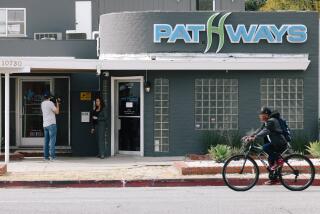Kevorkian Faces Jury, Asks: ‘Do You See a Murderer?’
- Share via
PONTIAC, Mich. — Looking rumpled and grandfatherly in his $3 gray thrift-store suit, Jack Kevorkian stood before a jury here Thursday and made what was perhaps the strongest defense argument of his murder trial.
“Just look at me,” he said, lifting his arms slightly. “Just look at me. Do you see a murderer?”
Half an hour later, the panel left the courtroom to decide the fate of the retired pathologist in a murder trial that could prove the end of his decade-long crusade for physician-assisted suicide. The seven-woman, five-man jury deliberated nearly five hours Thursday, and will resume deliberations this morning.
The case, which was expected to take more than a week, was in its third day when it went to the jury. And Thursday was the oddest yet, as the 70-year-old Kevorkian, acting as his own attorney, mounted a defense that included no witnesses, no exhibits and a closing statement punctuated by frequent objections from the opposing lawyer.
Prosecutor John Skrzynski, in his closing argument, said Kevorkian killed Thomas Youk in September for a single selfish reason: to further his push for legalized euthanasia.
“Is that any better than murder for hire?” Skrzynski asked. “He came like a medical hit man in the night, with his bag of poison to do the job.”
Death Was Broadcast on Television
Kevorkian is accused of injecting the 52-year-old Youk, who suffered from Lou Gehrig’s disease, with a fatal drug cocktail. He recorded the death on videotape, which CBS broadcast in February along with an interview in which Kevorkian dared prosecutors to charge him.
He also faces one count of delivery of a controlled substance.
Despite the pleas of two attorneys who are helping Kevorkian--as well as Geoffrey Fieger, who successfully defended him on assisted-suicide charges for years, and even the judge--the man sometimes known as “Dr. Death” chose to act as his own counsel.
That insistence, and his lack of a coherent defense, has led to speculation by Fieger and legal experts that Kevorkian may be aiding in his own conviction to perhaps further the cause of euthanasia as a martyr. He has pledged to starve himself to death in prison if convicted.
His showing Thursday did little to quell such talk.
Early in the day, prosecutors asked that the lesser charge of involuntary manslaughter be added to the jury’s choices of first-degree or second-degree murder. Kevorkian called their move an act of “cowardice.”
“I don’t think they should back down,” he said.
Manslaughter Conviction Possible
Oakland County Circuit Judge Jessica Cooper ruled the jury could consider a manslaughter conviction.
Much of Kevorkian’s closing argument centered on his reason for injecting Youk, a legally murky theme he has raised several times during the trial.
The prosecutor “has to prove that I intended to kill [Youk],” Kevorkian said. “I intended to do my duty, not to kill. Tom Youk didn’t come to me saying, ‘I want to die. Kill me.’ He said, ‘Help me.’ ”
At one point, attempting to differentiate between homicide--which can be the justifiable killing of a human--and murder, Kevorkian went to a chalkboard. Employing mathematical symbols, he scribbled a sort of logic puzzle: Homicide is not equal to murder; euthanasia is equal to homicide; therefore, euthanasia is not equal to murder.
Kevorkian also had hoped to call Youk’s wife, Melody, and brother Terry to the stand, but Cooper ruled Thursday that their testimony would be prejudicial. Prosecutors initially had filed an assisted-suicide charge as well against Kevorkian but dropped that complaint after Cooper ruled that testimony about Youk’s pain and suffering could be admitted under that charge but not under the murder charge.
If Kevorkian’s legal arguments were not always clear, he was charming and forthright, qualities that have served him well in four past trials, three of which ended in acquittal, the fourth in a hung jury.
“If I looked inept, I was,” he said with a smile, apologizing to the jury for his amateur lawyering. But “I do not lie. I do not exaggerate.”
When it comes time to render their verdict, Kevorkian told the jurors, a vote to acquit will “lead to human progress, a little, when we need it.”
More to Read
Sign up for Essential California
The most important California stories and recommendations in your inbox every morning.
You may occasionally receive promotional content from the Los Angeles Times.













